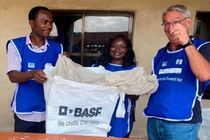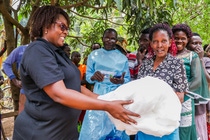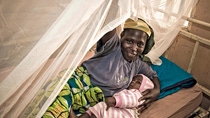Agriculture
Creating a Circular Economy with End-of-Life Insecticide-Treated Nets in Nigeria
The management of insecticide-treated nets (ITNs) waste is a high priority in environmental management. Considering that over three billion ITNs have been shipped to malaria-endemic countries since 2004, it is certain that large quantities of plastic materials from these nets remain in the environment, particularly in sub-Saharan Africa.

The creation of a circular economy with plastics is the contemporary thinking that aligns with the environmental concerns related to ITN waste. Dr Jean-Marc Ricca, CEO of BASF West Africa, emphasizes that “BASF is committed to acting as an enabler for the creation of a circular economy for end-of-life insecticide-treated nets (EOLINs) in Nigeria and other countries”.
In April 2022, BASF commissioned a scoping study to understand the attitudes and perceptions of households regarding EOLINs. This was the first step in a series of activities planned to develop a framework for the evidence-based management of ITN waste. The study revealed that about 50 per cent of households still retained their “old” nets, which were no longer of use for malaria prevention. The study also found that those households that did not retain their old nets primarily disposed of the EOLINs through open-air burning or left them among household garbage, both practices discouraged by the World Health Organization (WHO) because of the potential harmful impact on the environment.

The proof of concept (PoC) for the evidence-based management of EOLINs was timed for implementation with the ITN mass campaign in Cross River State, which took place in May/June 2023. BASF worked with the National and State Malaria Elimination Programmes and the United States President’s Malaria Initiative (PMI) and its campaign implementing partners, Global Health Supply Chain Programme – Procurement and Supply Management (GHSC-PSM) and Breakthrough Action – Nigeria (BA-N), to conduct the PoC processes.
The objectives of the PoC were to determine the operational feasibility of an EOLIN collection exercise, determine the potential yield to be obtained from a non-incentivized collection process, identify local resources for potential recycling initiatives, as well as resource requirements to take an EOLIN collection exercise to a district, province or nation-wide scale. The collection of EOLINs at 25 designated distribution/collection points in Akamkpa and Calabar South Local Government Areas (LGAs) of the State took place from 17 to 27 June 2023.
BASF collected a total of 3,811 kgs of ITN-related waste – primarily in the form of plastic packaging from the 63,530 ITNs distributed to households at the 25 EOLIN distribution points in the two LGAs, thus contributing to the effective management of plastic waste during the campaign.
Unfortunately, only 241 EOLINs were collected during the exercise. The reasons why some households still retained their old nets included: not hearing about the information to turn in old nets; non-receipt of a net card and consequent non-receipt of a new ITN; continued use of old nets for a myriad of purposes, such as for protecting crops.
It is estimated that for the over two million ITNs distributed in Cross River State, 120 metric tonnes of plastics would have been generated. If these EOLINs were recycled, an estimated USD 32,000 street value could have been obtained.
The key achievements of the PoC include the demonstration of the operational feasibility of an EOLIN collection exercise, tying an EOLIN collection exercise to a mass ITN campaign as well as the possibility of collecting all campaign plastic waste and recycling it instead of burning and burying as currently practised.
The lessons learned from the Cross River State PoC include the need for early planning and clarification of roles and responsibilities of co-implementers (especially the State Malaria Elimination Programmes which should lead malaria elimination efforts in their states), strengthening overall social and behaviour change for the PoC and communicating the rationale for the collection exercise to households.



